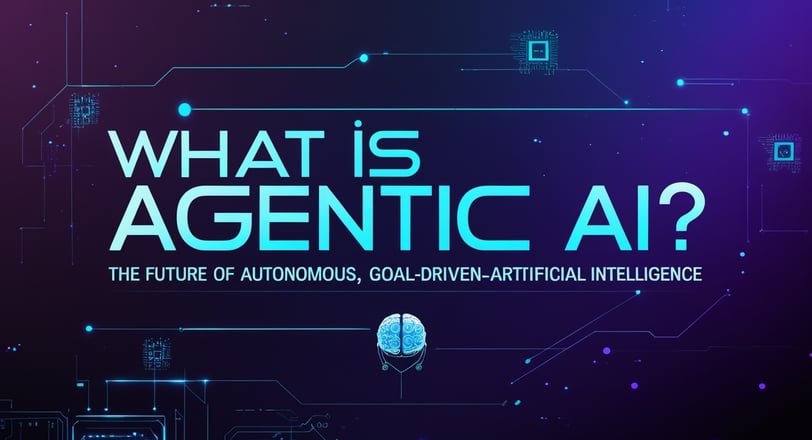What Is Agentic AI? The Future of Autonomous, Goal-Driven Artificial Intelligence
Discover What Is Agentic AI? The Future of Autonomous, Goal-Driven Artificial Intelligence that acts proactively, makes decisions independently, and transforms industries with smart, goal-focused automation. Stay updated with the latest insights and breakthroughs in agentic AI technology.


What Is Agentic AI? The Future of Autonomous, Goal-Driven Artificial Intelligence
Artificial Intelligence (AI) has rapidly evolved from simple rule-based automation to highly advanced systems capable of understanding and interacting with humans. Among the latest breakthroughs is Agentic AI—a form of AI that can act autonomously, pursue goals, and make decisions independently, rather than just responding to instructions or generating content.
Defining Agentic AI: Autonomous, Goal-Driven Intelligence
Agentic AI refers to AI systems designed to act independently to achieve specific goals without requiring constant human intervention. Unlike traditional AI or generative AI models (like ChatGPT), which mostly generate responses based on prompts, agentic AI systems have the ability to:
Interpret complex goals and contexts
Plan and execute multi-step actions
Adjust and learn from feedback
Collaborate as a team of specialized agents
As Enver Cetin, an AI expert, puts it, “Agentic AI means AI models that can act independently and carry out tasks to achieve goals without ongoing human guidance.”
Why Is Agentic AI Different from Other AI?
Proactive vs Reactive: Traditional AI often reacts to specific commands or queries. Agentic AI anticipates needs, takes initiative, and makes decisions to fulfill broader objectives.
Team-based Approach: Instead of a single monolithic AI, agentic AI involves multiple specialized agents, each responsible for different roles, working together to reach a common goal.
Context Awareness: Agentic AI incorporates organizational goals, market contexts, and company values, which human workers often understand implicitly but AI systems must be explicitly programmed to handle.
Key Benefits of Agentic AI
1. Workforce Specialization and Efficiency
Agentic AI divides complex tasks into specialized roles across multiple agents. This is reminiscent of Adam Smith’s principle of specialization: dividing labor increases productivity and quality. Each AI agent focuses on tasks like data analysis, content generation, decision-making, or workflow management, making the system more efficient and adaptable.
2. Accelerated Innovation
Agentic AI can quickly test, learn, and iterate, speeding up innovation cycles. For example, AI agents have aided in chemical research and material design, discovering new solutions far faster than traditional methods.
3. Trustworthy Decision-Making
Compared to generative AI, which sometimes produces inaccurate or "hallucinated" results, agentic AI systems can evaluate data credibility, audit their outputs, and align decisions with ethical standards and company policies, making their recommendations more reliable.
Real-World Use Cases of Agentic AI
Customer Service
Agentic AI chatbots, such as those developed by Ema, are transforming customer service by understanding customer emotions and intents. They proactively predict issues (like delivery delays), inform customers, offer compensations, and improve over time by learning from interactions.
Manufacturing
In manufacturing, agentic AI analyzes sensor data from machines to predict failures, optimize production lines, and reduce downtime.
Sales Support
Sales teams benefit from AI agents that handle administrative tasks, interpret customer communications, schedule meetings, and provide coaching. Salesforce’s Agent Force platform exemplifies how agentic AI can assist sales representatives in focusing on high-value activities.
Health and Social Care
Agentic AI agents show empathy and adaptiveness critical for caregiving roles. For instance, Hippocratic AI’s “Sarah” helps elderly patients with daily routines, medication reminders, and emotional support, while “Judy” aids with pre-operative care.
Challenges in Deploying Agentic AI
Despite its potential, agentic AI is still maturing and presents unique challenges:
Team Coordination: Managing multiple AI agents requires ensuring they perform complementary roles without conflict or resource clashes.
Human-AI Collaboration: Integrating AI teams with human workers needs thoughtful design to build trust and efficiency.
Error Handling: Like humans, AI agents can make mistakes. Ensuring appropriate oversight and fallback mechanisms is critical to avoid costly errors.
Imperatives for Success: How to Harness Agentic AI Effectively
Set SMART Goals
Agentic AI systems need SMART (Specific, Measurable, Achievable, Relevant, Time-bound) goals clearly defined with contextual information, such as why these goals matter to the company and their expected impact. Managers must also establish continuous feedback loops to refine AI performance.
Careful Team Selection
Agentic AI is a team sport. Selecting the right combination of specialized agents for different tasks and ensuring smooth coordination is vital. Managers must also define clear roles for human workers alongside AI agents.
Scaffold the Decision Space
Agentic AI requires a structured “scaffold” for decision-making. This means setting safe boundaries, supervision protocols, and well-defined limits early on, gradually reducing oversight as the AI systems gain experience and reliability. This approach is inspired by human learning methods and helps minimize risks.
Looking Ahead: The Promise and Responsibility of Agentic AI
From early mechanical automations to today’s conversational bots, the dream of autonomous intelligent machines is closer than ever. Agentic AI promises significant benefits—boosted productivity, faster innovation, and better insights for businesses and society.
However, with great power comes great responsibility. Risks like bias, errors, and misuse demand proactive management. Business and government leaders must act now to shape agentic AI development, ensuring these systems are safe, fair, and aligned with human values.
Agentic AI is not just a technological advancement; it is a transformative shift in how humans and machines collaborate. The future will belong to those who master this new form of intelligence wisely.
